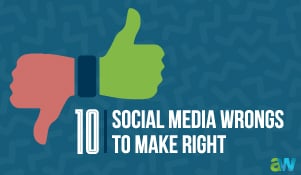Lifecycle Marketing has emerged as a key tool for small businesses, closing the gap between the essential components of lead generation, customer relationship management, and sales. Long used by bigger companies, the tools are now priced affordably enough that small businesses may also incorporate them into their marketing arsenals.
While many have heard of lifecycle marketing (a.k.a. marketing automation), the concept is not always clear and there are often misconceptions about the practice. Last month's post "Lifecycle Marketing: Big Business Tools, Small Business Affordable" covers what it is and what some of the tools are that are commonly available.
How can lifecycle marketing impact your business? Sales? Customer service? Here are 5 indicators that you might need marketing automation:
(1) Do you need to generate more leads?
Lead generation is a central piece of marketing automation. From opening multiple avenues of generating leads to increasing referrals and repeat sales and helping you continuously improve your marketing campaigns, marketing automation reduces the sales cycle and helps you close business faster.
(2) Are there gaps in your leads management process?
One of the biggest challenges small businesses face is developing and consistently applying a seamless and efficient process for responding to and nurturing leads. Meanwhile, statistics show that this very challenge—responding promptly—has a direct impact on conversion of sales. According to InsideSales.com, if you follow up with web leads within five minutes, you're nine times more likely to convert the sale. Similarly, 50% of sales go to the first salesperson to contact the prospect. Marketing automation systemizes your processes and ensures that no prospects fall through the gaps.
(3) Are you losing business due to the divide between your sales and marketing? So many firms invest in marketing campaigns, advertising, and other initiatives but do not have the follow-through to actually convert the leads into sales. The longer the sales process draws out, the more difficult it becomes to nurture prospects—unless you have a tool and process for doing so. The payoff, however, for nurturing leads is well worth the effort. A recent study shows that nurtured leads make 47% larger purchases than non-nurtured leads. (Source: The Annuitas Group)
(4) How well do you know your prospects and customers?
In our hyper-connected, highly personalized world, every customer and prospective customer wants to be marketed to as an individual. Delivering this level of personalization starts with truly knowing the customer—what are their preferences? What have they bought from you in the past? What products or services were they interested in but did not buy? What communications have they had with your business in the past? Do they subscribe to your blog or newsletter? Marketing automation not only keeps up with these details, but enables you to act based on the insights, and even automates those follow-up sequences.
(5) Are you having difficulty measuring or proving the ROI for your marketing efforts?
Almost all marketing initiatives have some means of measuring success, but where many fall short is in actually tracking the long-term results to sales which may have a longer closing cycle or require multiple touches and nurturing. Marketing automation software enables you to pull all of your marketing together—both online and offline initiatives—and track their impact on sales from the initial contact with a customer throughout the entire life cycle of your relationship.
Marketing automation provides these (and many more) opportunities for businesses to generate, nurture, close, and upsell business while gathering actionable customer preferences along the way. Isn't it time for you to take a closer look?









Leave a comment